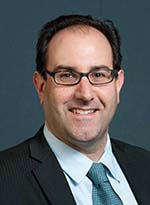Developing Partnerships with Wabanaki Tribal Nations
Darren Ranco reflects on ten years of building a pathway of collaboration between university researchers, students, and Wabanaki Tribal Nations
Ten years ago, Darren Ranco arrived at UMaine’s Department of Anthropology to serve as Chair of the Native American Programs and Coordinator of Native American Research. He also joined the National Science Foundation’s newly-launched Sustainability Solutions Initiative (SSI). That initiative led to the creation of the Senator George J. Mitchell Center for Sustainability Solutions, where Ranco is also a faculty member.

In a September 30 Mitchell Center Sustainability Talk, Possibilities for Partnership: University-Indigenous Nations and Research in the 21st Century, Ranco will reflect on a decades-worth of efforts building a pathway of collaboration between university researchers and students and Wabanaki Tribal Nations.
Ranco’s project under SSI—Mobilizing to Fight an Invasive Insect—was the first in the nation to bring together diverse groups to prepare for the expected arrival in Maine of the emerald ash borer (EAB), which threatens brown ash trees used in basket-making. Other related projects have followed, with collaborators including the Maine Indian Basketmakers Alliance, tribes, university researchers, state and federal foresters, and others. A key element of Ranco’s research is the involvement of both graduate and undergraduate students.
“One of the takeaways of my talk will be the power of students and linking students to the communities they’re from in terms of research,” Ranco says. “The Mitchell Center does a great job of creating research opportunities for undergraduates in particular, which is a really important part of building partnerships with their communities.” He adds, “Sustainability work and taking partnerships seriously through research was something that without the Mitchell Center, without that community of scholars, it’s really hard to imagine that happening here.”
Ranco says that alot of the energy for this research has come from working with Bridie McGreavy, an assistant professor of environmental communication and Mitchell Center Faculty Fellow, and others to develop partnerships with the tribes and create pathways of collaboration. “I see this being an overall institutional development and how individual researchers and projects are shaped by, and shaping, partnerships with tribal nations.”
As part of the Future of Dams project, McGreavy, Ph.D. candidate Tyler Quiring, and others “explored dam removal from the Penobscot Nation perspective, partly due to collaboration with one of our native students,” Ranco says. “That individual student created a pathway for partnership between the university, Bridie, Tyler and the Penobscot Nation.”
Ranco will also talk about the broader set of methods and commitments (e.g. the Memorandum of Understanding with UMaine and the on-campus bilingual signage—English and Penobscot), “things that are institutional. Nothing is happening in an isolated way, it is about signal and response in terms of how serious UMaine is being taken in places like the Penobscot Nation or other tribes, by doing other kinds of work it builds up the trust, not treating it like this is the work of one person but an institutional set of work.”
By “signal and response” Ranco means developing deeper partnerships, not just getting more people involved “but how do we also be serious in terms of the commitment by the institution around prioritizing this relationship and treating it with the kind of respect that it requires. So in the context of the tribal communities, seeing that signal of seriousness of commitment creates more pathways as well.”
Another area of collaboration has been to bring these research elements into the classroom in a hands-on fashion, an effort in which Ranco says McGreavy has made major contributions.
“We also received a National Science Foundation INCLUDES grant in which we’re bringing together Western science and indigenous science in the classroom.”
Mitchell Center Sustainability Talks take place Mondays at 3pm in 107 Norman Smith Hall unless otherwise indicated. Talks are free and open to the public, and refreshments are served.
